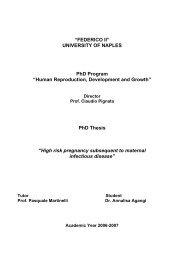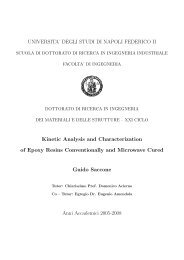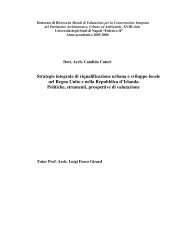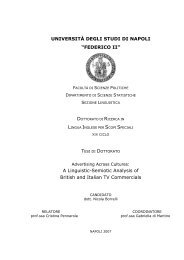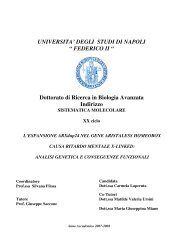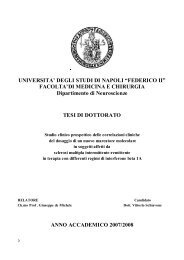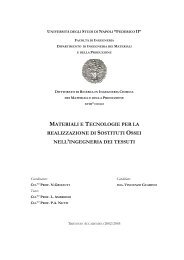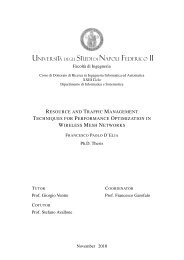UNIVERSITY OF NAPLES PhD Program “Human ... - FedOA
UNIVERSITY OF NAPLES PhD Program “Human ... - FedOA
UNIVERSITY OF NAPLES PhD Program “Human ... - FedOA
You also want an ePaper? Increase the reach of your titles
YUMPU automatically turns print PDFs into web optimized ePapers that Google loves.
INTRODUCTION<br />
Pediatric functional gastrointestinal disorders (FGIDs) include conditions in which a variable<br />
combination of often, age-dependent, chronic, or recurrent symptoms, such as vomiting,<br />
constipation, abdominal pain, are not explained by structural or biochemical abnormalities.<br />
As the child is programmed to develop, some functional disorders which occur during childhood<br />
accompany normal development, or may triggered by age appropriate but maladaptive behavioral<br />
response to internal or external stimuli. According to a biopsychosocial conceptualization of the<br />
pathogenesis and clinical expression of the FGIDs, early in life and genetics, in addition to<br />
environmental factors such as family influences on illness expression, abuse, major losses, or<br />
exposure to infections, may affect one’s psychosocial development in terms of one’s susceptibility<br />
to life stress or psychological state and coping skills, as well as susceptibility to gut dysfunction,<br />
abnormal motility, altered mucosal immunity, or visceral hypersensitivity. Furthermore, these<br />
“brain-gut” variables reciprocally influence their expression. Therefore, FGIDs are the clinical<br />
product of this interaction of psychosocial factors and altered gut physiology via the brain-gut axis<br />
(1).<br />
Genetic factors may predispose some individuals to develop FGIDs, whereas in others,<br />
environmental factors contribute to the phenomic expression of these conditions, as well as patient<br />
attitudes and behaviours (including health care seeking) relating to it. Some infants may inherit a<br />
genetic susceptibility to FGIDs characterized by a particular gastrointestinal reactivity to stress.<br />
This temperament-sensitive reactivity seems to be associated to other biological systems such as the<br />
cardiovascular, neuroendocrine and immunologic (2). Several pathways may be involved in this<br />
genetic predisposition, including lower levels of IL-10 (an anti-inflammatory cytokine) in some<br />
patients with IBS (3) that may effect gut mucosal neural sensitivity, serotonin reuptake transporter<br />
polymorphisms that can effect levels of 5-HT neurotransmitter, or the response to 5-HT blocking<br />
agents (4,5) g-protein polymorphisms that can affect both CNS and gut-related actions (6) and 2adrenoreceptor<br />
polymorphisms that affect motility (7). Serotonin reuptake transporter<br />
polymorphisms have effects on mood disturbances (8) and may be a genetic link to disorders of<br />
brain-gut function such as IBS. This represents an interesting area for future studies.<br />
The aggregation of FGIDs in families (9) is not only genetic. Also environmental factors<br />
during early life may play a role in the development of FGIDs. Plasticity of the neonatal brain<br />
allows early life events to program physiologic response to stress during infancy that may be<br />
perpetuated into adulthood (10). Furthermore, what children learn from parents may contribute to<br />
the risk of developing an FGID(11, 12) In fact, children of adult patients with IBS make more<br />
health care visits (and incur more health care costs) than children of non-IBS parents (13,14), so the<br />
family should be aware about the role that psychosocial factors play in the development and<br />
perpetuation of FGIDs.<br />
Nevertheless psychosocial factors do not define the FGIDs and are not required for<br />
diagnosis, research in this field yields three general observation: 1) psychological stress exacerbates<br />
GI symptoms; 2) psychosocial factors modify the experience of illness and illness behaviours such<br />
as health care seeking; 3) a functional gastrointestinal disorder may have psychosocial<br />
consequences on one’s general well-being, daily function status, one’s sense of control over the<br />
symptoms, in one word on one’s quality of life.<br />
Patients with FGDIs often exhibit sensory afferent dysfunction of the digestive tract that is<br />
manifested as altered sensitivity to luminal distention or other stimuli, and that selectively affects<br />
the visceral territory (15). Sensation and motility represent the two aspects of gut physiology most<br />
relevant to the FGIDs. In health, physiological stimuli from the gut induce motor reflexes, but these<br />
remain largely unperceived, with the exception of those related to ingestion and excretion.<br />
Depending on specific organs affected, visceral hypersensitivity may underline common symptoms<br />
in the FGIDs such as chest pain, abdominal discomfort, abdominal bloating, urgency defecation.<br />
Gut sensitivity is intimately related to gut motility. Sensory and motor functions of the<br />
4



